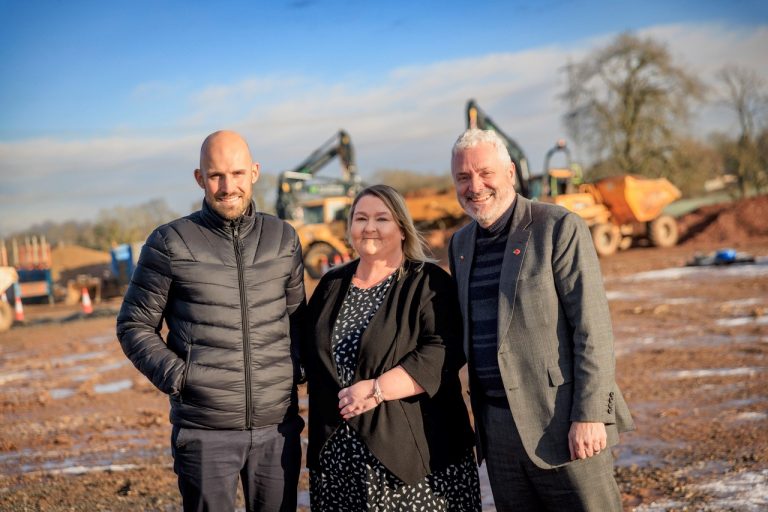Firms offered free post-Brexit regulation advice by Trading Standards experts
Major plans for Grimsby leisure development approved
Leicester City chairman relieves Club of outstanding debts to parent company
Sills & Betteridge boosts Commercial Litigation & Dispute Resolution Team
Sills & Betteridge’s Commercial Litigation & Dispute Resolution Team has recently been boosted with the appointment of solicitor Rachael O’Sullivan. Rachael deals with all aspects of litigation, including landlord and tenant disputes, land and boundary disputes, disputes between cohabitees under the Trusts of Land and Appointment of Trustees Act 1996, injunctions, committal applications, breach of contract and debt claims. Prior to joining the firm, Lincoln-born Rachael attended university in Nottingham and then took a year out to travel around South-East Asia, and to teach English in Thailand. She returned to Lincoln and spent 6 years working in house for an insurance company in the private residential sector, dealing with landlord possession claims. She gained extensive advocacy experience representing clients at trials in the County Court. Rachael then decided to resume her studies, starting her Legal Practice course in 2019 for which she obtained a distinction, fully qualifying as a solicitor last year. A keen advocate, Rachael will be undertaking a Higher Rights of Audience course in March 2023. Senior partner, and head of Commercial Litigation & Dispute Resolution, Karen Bower-Brown said: “We are delighted that Rachael has joined our busy team. She complements the existing arrangements extremely well with her broad litigation knowledge and experience in representing both claimants and defendants. She has settled in well and I am looking forward to seeing her legal career progress with Sills & Betteridge.” Rachael said: “I have known Karen and her colleagues in the litigation department professionally for some time, and always admired the pragmatic approach they take to achieve the best outcomes for their clients. I am very fortunate to work in a team which deals with such a wide range of commercial and civil dispute matters and know I will benefit greatly from their support and mentorship.” Rachael will be based at Lincoln but will handle cases across the wider Lincolnshire area, Yorkshire and the East Midlands.
KPMG set to invest in the Midlands following strong financial year
Bridge Help makes senior promotion
Chesterfield-based commercial finance specialist, Bridge Help has promoted Katie Snodden to the newly created role of head of sales.
The promotion recognises the significant contribution Katie has made to the business since she joined as a business development manager in 2021.
In 2022 alone Katie secured more than £8m worth of loans for brokers throughout England and Wales. In her newly created role, she will now lead Bridge Help’s team of business development managers in growing the company’s loan book which it aims to double in 2023.
Chris Sellars, CEO and general counsel of Bridge Help, said: “Katie has built some amazing relationships across the industry, all whilst taking on additional responsibilities within the company. Her appointment is integral to our growth plans for next year and she is absolutely the right person for this role.” Katie added: “I am thrilled to take on this exciting role. One of the many reasons I joined Bridge Help was the opportunity to grow my career and skillset within the business.”
Katie joined the bridging finance sector from the transport and logistics sector having previously worked within financial services for a large, chartered accountancy firm in London. Her appointment at Bridge Help signalled her return to the financial services sector, which she describes as her ‘first love’.
Enrok Construction appoints new quantity surveyor
Derbyshire-headquartered Enrok Construction has appointed a new quantity surveyor as part of its ongoing growth strategy.
Stuart Wedge, who has almost a decade of experience gained across the construction sector, joins Enrok to work across the company’s ongoing projects in the Midlands. These include the restoration of a former mill on Crocus Street, Nottingham, into 27 apartments and a new affordable housing scheme in Handsworth, West Midlands.
Stuart joins Enrok as the company continues to bolster its team as part of its growth plans for the New Year, following a successful 2022. Enrok’s ambitious growth plans were among the reasons Stuart joined the team.
Commenting on his appointment, Stuart Wedge says: “Enrok has a strong team in place already and I am looking forward to adding my experience to the company. The company’s growth ambitions and the potential for me to develop my role on numerous ongoing projects really appealed to me.
“Our work within the affordable housing sector is also something that aligns with my values. I wanted to be part of a company that is committed to working with housing associations to deliver more affordable homes for people across the UK.”
Simon Bennett MCIOB, operations director at Enrok, adds: “Stuart has direct experience that will quickly benefit our client’s projects across the Midlands. His ambition to be part of a growing business impressed us and we are all delighted that he has joined the Enrok team.
“As we focus more on working with Housing Associations in the Social Housing sector, it is essential that we have the right people in the right places across the business. We feel we have achieved this with Stuart, and I am looking forward to working with him.”
Hospital Services Limited launches East Midlands headquarters
Sentiment amongst SME manufacturers remains weak as output falls and cost and price inflation remain high
Rolls-Royce talks to Czech Republic over deployment of SMR nuclear technology
Derbyshire is promoted to the world to reboot visitor economy
Walkers buys land for new plant from Leicester City Council
Developers forced to sign contracts to repair unsafe buildings
“There will be nowhere to hide for those who fail to step up to their responsibilities – I will not hesitate to act and they will face significant consequences.”
“The terms of the contract are entirely consistent with our existing commitment to protect leaseholders in multi-storey buildings we constructed from the costs of remediating cladding and life-critical fire-related safety issues. We are pleased to reaffirm this commitment today and that we were able to work constructively with the Government to secure the agreement.”
Government dangles £1m carrot to attract SME safety ideas
A million pound fund for new ideas to boost health and welfare at work for SMEs and the self-employed has been launched.
Tom Pursglove, Minister for Disabled People, Health and Work, said: “Good occupational health within workplaces is vital in supporting our overall health and standard of living. We spend so much of our lives at work, and it is imperative that our employers can give us the support we need to maintain our physical and mental health. This in turn means we can give our best at work.
“Through the launch of our new £1 million fund, I look forward to seeing innovative, workable solutions to help SMEs deliver the best for their employees, creating healthier, welfare-driven working environments that will ultimately drive growth and improve people’s working lives.”
Successful bidders will receive up to £100,000 to back their projects from May this year, with the Government looking for innovative solutions to drive better access for SMEs and the self-employed to Occupational Health services. Applicants are being encouraged to demonstrate how they would deliver improvements to OH, harnessing technology such as artificial intelligence or data collection, to deliver better health outcomes for employees of SMEs.
Better health provision for staff helps employers look after their workforce, meaning more are likely to stay in work. While larger employers often have better access to OH services, for smaller businesses and the self-employed the lack of support for people with health needs can potentially lead to more people becoming economically inactive.
Applications can be from those who work alone or with others from business, research organisations, research and technology organisations or the third sector, with the Government looking for proposals to:
- Discover new and innovative ways for the OH market, which supports people to stay well in work, to deliver services that drive better access for SMEs and self-employed
- Discover new and innovative ways that the OH market can deliver services and better serve the demand for OH
- Deliver innovations that can be scaled up for businesses to have an impact in the OH market through new services and better use of technology
The competition is a joint venture between the Department for Work and Pensions (DWP) and The Department for Health and Social Care (DHSC), as part of the Joint Work and Health Unit, and in conjunction with Innovate UK, an arm of UK Research and Innovation. The fund will be open to applications from 30 January 2023 and run until 15 March 2023.
The new Fund to Stimulate Innovation in Occupational Health (OH) competition will be delivered in the form of a Small Business Research Initiative, a well-established, output driven funding tool run by Innovate UK.
For more details about the Fund to Stimulate Innovation and how to apply, visit this link.
Stay informed at Streets Chartered Accountants’ Annual Payroll & HR Update 2023
Whether you have just one employee or a large workforce, you do payroll in house or use a payroll bureau, Streets Chartered Accountants’ Annual Payroll & HR Update 2023 aims to keep you informed of the issues, regulations and changes affecting payroll management and compliance.
Taking place on Friday 10 February, 11am – 12 noon, the virtual event will also consider the tax implications and changes around staff employment and employee remuneration.
Last but not least it will look at the broader HR matters that may concern employers now and in the year ahead, along with the potential impact of changes to and the introduction of new employment legislation.
Payroll – a topical update and refresherTheresa Waddingham – payroll director, Streets Chartered Accountants Theresa’s presentation will focus on the forthcoming changes affecting payroll as we start a new tax year, along with some useful hints and tips to make your life easier to ensure that those charged with payroll are on the right track. Her presentation will include the following:- Tax codes from employer/payroll perspective – best practice
- NMW/NLW rates for 2023
- NI/Tax/Statutory Payments
- Payroll and overseas employees
- The true cost of pay rises
- The benefits of outsourcing payroll
- What the future holds – future bills on their way through parliament with government backing including flexible working, carers leave, protection from redundancy and employment allocation of tips
- Salary Sacrifice
- EV Company Cars
- Company Cars versus private car use
- IR 35
- Working from home allowances
- PAYE Reviews and investigations
- An employer’s responsibilities to support employees during a cost-of-living crisis
- What is a ‘typical’ pay rise?
- What else employers can do to retain and engage their employees instead of and as well as pay rises
To register for the event click here.
The presentation will be recorded and available on demand for those not able to join live. Simply register to receive a link to watch on demand.Local company commits to future in Hinckley
Life science company takes space at MediCity Nottingham
Just Vehicle Solutions goes full throttle with expansion
Revenue up at Microlise Group
Revenue is up at Microlise Group, the Nottingham-headquartered provider of transport management software to fleet operators, according to a full year update on trading for the year ending 31 December 2022.
The company expects to report year-on-year revenue growth of 5% to £63.2m, despite industry headwinds caused by microchip supply chain issues and delays in project deployment with non-OEM customers. This resulted in non-recurring revenues slightly below forecasts.
However, the firm delivered record levels of OEM sales which impacted sales mix and had positive working capital effect. As a result of the change in sales mix, annual recurring revenues grew at a faster rate than revenue, by 10% to £42.6m, with recurring revenues now representing 64% of the total.
Meanwhile EBITDA is slightly ahead of market expectations.Nadeem Raza, CEO, Microlise, said: “I am delighted to report that we shipped more units than ever during 2022, despite the well-documented supply chain issues that clouded our markets throughout the year. This pays testament to the strength of our products and the quality of our staff who have been agile and resourceful in the face of any issues, adapting where appropriate while improving efficiencies and the positioning of our company.
“Also, our new Great Place to Work (GPTW) accreditation reflects the passion and positive attitude of our people, all of whom are committed to building a supportive atmosphere. It recognises our commitment to staff and further establishes Microlise’s high-performing workplace culture.
“Although we can expect supply chain issues to continue to impact our markets in 2023, we do anticipate improvements during the second half of the year. This, combined with a record order book and healthy pipeline of opportunities across all the markets in which we operate, gives us confidence for the year ahead.”






















